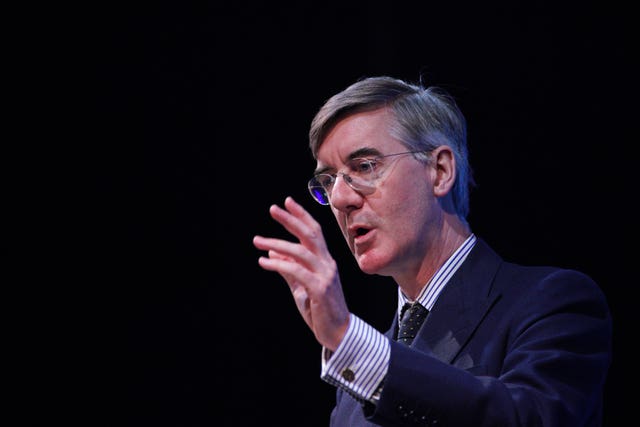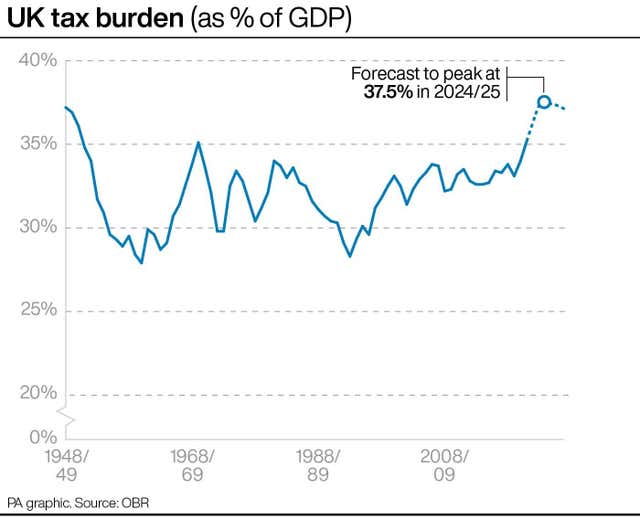
Jeremy Hunt has been warned his planned spending cuts may prove “undeliverable” as he faced criticism from some senior Tories for raising taxes as he seeks to rebuild the UK’s battered public finances.
Former business secretary Jacob Rees-Mogg accused the Chancellor of taking the “easy option” in Thursday’s autumn statement rather than bearing down harder on public spending.
He said the country needed lower taxes to drive up growth after Mr Hunt acknowledged that the UK was already in recession.
At the same time, independent analysts said Mr Hunt’s promised spending cuts would mean a prolonged squeeze on public sector pay despite a growing clamour in many services for real-terms increases after the years of austerity.
 Jacob Rees-Mogg accused the Chancellor of taking the ‘easy option’ with tax cuts (Peter Byrne/PA)
Jacob Rees-Mogg accused the Chancellor of taking the ‘easy option’ with tax cuts (Peter Byrne/PA)
The Institute for Fiscal Studies (IFS) said delaying the difficult decisions as to where the axe will fall until after the next general election would “stretch credulity” and questioned whether they would actually happen.
Mr Hunt set out his plans for £55 billion of tax hikes and spending cuts against the backdrop of a bleak set of economic forecasts from the Office of Budget Responsibility (OBR), underlining the damage wreaked by the war in Ukraine.
It said that rampaging inflation as a result of the energy price shock meant living standards are set to fall by 7% over the next two years – taking them back to where they were in 2014.
The economy is predicted to contract by 1.4% next year, unemployment is expected to rise by more than 500,000 while taxes are set to reach their highest level as a share of national income since the end of the Second World War.
 (PA Graphics)
(PA Graphics)
In the Commons, Mr Hunt said the measures he was taking – £25 billion in tax rises and £30 billion in spending cuts – would mean the downturn in the economy would be “shallower” than would have otherwise been the case.
Spending on health, education and defence will be protected, support for energy bills will continue although at a lower level, while benefits and pensions will rise in line with inflation.
Much of the increase in taxes will come from extending the freeze on thresholds – meaning that more people get drawn into paying the basic and higher rates of tax, although different rates apply in Scotland.
Mr Rees-Mogg however strongly criticised the Chancellor’s approach, warning the increases will hit many people who are not particularly well off, including some who are receiving benefits.
"The next few years look grim in terms of living standards, the biggest reduction in household incomes, possibly on record and certainly within recent generations."
📺 @PJTheEconomist on what today's Autumn Statement means in 100 seconds. pic.twitter.com/lHSdySOFUV
— Institute for Fiscal Studies (@TheIFS) November 17, 2022
“I think we need to look at the efficiency of government to make sure money is well spent before reaching for the easy option of putting up taxes,” he told Channel 4 News.
“What we actually need to be doing is having a strategy for growth and looking to lower taxes.”
Mr Rees-Mogg is a longstanding critic of Rishi Sunak, having criticised his record of raising taxes when he was chancellor and quitting when he became Prime Minister.
Nevertheless there is likely to be concern some among ministers that his intervention could signal trouble ahead, with many Tory MPs concerned about raising taxes as the country enters a recession.
Meanwhile, IFS director Paul Johnson questioned whether spending cuts due to kick in after 2025 could be delivered, with services like the police, the courts and local government facing “a very difficult few years”.
“Delaying all of the difficult decisions until after the next general election does cast doubt on the credibility of these plans. The tight spending plans post-2025, in particular, may stretch credulity,” he said.
A return to austerity? The Chancellor announced deep public spending cuts in his #AutumnStatement – but they're not coming in until after the next election. It is doubtful these cuts will ever be delivered, as they'd require a radical scaling back of public services… pic.twitter.com/AY1WLI4GG3
— Resolution Foundation (@resfoundation) November 17, 2022
The Resolution Foundation think tank said such cuts were “likely to be undeliverable” as they would require “years of holding down public sector wages below those in the private sector”.
In a round of post-statement broadcast interviews, Mr Hunt denied that he was putting off the difficult decisions.
“I think that a Conservative Chancellor who stands up in the Commons and announced £25 billion of tax rises, I don’t think anyone would say that is deferring a horrible decision,” he told ITV’s Peston programme.
He insisted said that his plan offered a route back to “more normality” for families across the country.
“Conservatives win elections when they are trusted with the economy. What you have seen today is a Conservative Chancellor outlining a very difficult path that gets us through this crisis,” he told the BBC.



Why are you making commenting on The Herald only available to subscribers?
It should have been a safe space for informed debate, somewhere for readers to discuss issues around the biggest stories of the day, but all too often the below the line comments on most websites have become bogged down by off-topic discussions and abuse.
heraldscotland.com is tackling this problem by allowing only subscribers to comment.
We are doing this to improve the experience for our loyal readers and we believe it will reduce the ability of trolls and troublemakers, who occasionally find their way onto our site, to abuse our journalists and readers. We also hope it will help the comments section fulfil its promise as a part of Scotland's conversation with itself.
We are lucky at The Herald. We are read by an informed, educated readership who can add their knowledge and insights to our stories.
That is invaluable.
We are making the subscriber-only change to support our valued readers, who tell us they don't want the site cluttered up with irrelevant comments, untruths and abuse.
In the past, the journalist’s job was to collect and distribute information to the audience. Technology means that readers can shape a discussion. We look forward to hearing from you on heraldscotland.com
Comments & Moderation
Readers’ comments: You are personally liable for the content of any comments you upload to this website, so please act responsibly. We do not pre-moderate or monitor readers’ comments appearing on our websites, but we do post-moderate in response to complaints we receive or otherwise when a potential problem comes to our attention. You can make a complaint by using the ‘report this post’ link . We may then apply our discretion under the user terms to amend or delete comments.
Post moderation is undertaken full-time 9am-6pm on weekdays, and on a part-time basis outwith those hours.
Read the rules hereLast Updated:
Report this comment Cancel